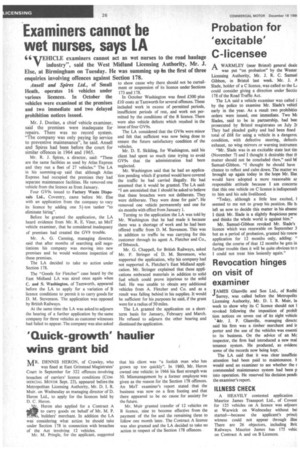Examiners cannot be wet nurses, says LA
Page 28

If you've noticed an error in this article please click here to report it so we can fix it.
VEHICLE examiners cannot act as wet nurses to the road haulage industry", said the West Midland Licensing Authority, Mr. J. Else, at Birmingham on Tuesday. He was summing up 4n the first of three enquiries involving offences against Section 178.
Ansel' and Spires Ltd., of Small Heath, operates 16 vehicles under various licences. In October the vehicles were examined at the premises and two immediate and two delayed prohibition notices issued.
Mr. J. Doolan, a chief vehicle examiner, said the premises were inadequate for repairs. There was no record system. "The company was only paying lip service to preventive maintenance", he said. Ansel] and Spires had been before the court for similar offences in 1964 and 1965.
Mr. R. J. Spires, a director, said: "These are the same facilities as used by Atlas Express and they run a fleet of 27 vehicles." The LA in his summing-up said that although Atlas Express had occupied the premises they had separate maintenance facilities. He removed one vehicle from the licence as from January.
Four GV9s issued to Factory Waste Disposals Ltd., Coventry, came before Mr. Else with an application from the company to vary its licence by adding one 51-ton tanker "to eliminate hiring".
Before he granted the application, the LA heard evidence from Mr. R. E. Viner, an MoT vehicle examiner, that he considered inadequacy of premises had created the GV9 trouble.
Mr. A. G. Canning, managing director, said that after months of searching and negotiations his company was moving into new premises and he would welcome inspection of these premises.
The LA decided to take no action under Section 178.
The "Goods for Fletcher" case heard by the East Midland LA was aired once again when C. and S. Washington, of Tamworth, appeared before the LA to apply for a variation of B licence conditions to permit it to carry goods for D. M. Stevenson. The application was opposed by British Railways.
At the same time the LA was asked to adjourn the hearing of a further application by the same company for three vehicles as customer witnesses had failed to appear. The company was also asked to show cause why there should not be curtailment or suspension of its licence under Sections 173 and 178.
In October Washington was fined £300 plus £10 costs at Tamworth for several offences. These included work in excess of permitted periods, insufficient periods of rest, and work not permitted by the conditions of the B licence. There were also vehicle defects which resulted in the issue of four GV9s.
The LA considered that the GV9s were minor and felt that sufficient was now being done to ensure the future satisfactory condition of the vehicles.
Mr. D. E. Skilding, for Washington, said his client had spent so much time trying to avoid GV9s that the administration had been neglected.
Mr. Washington said that he had an application pending which if granted would have covered the traffic he had carried illegally. He had assumed that it would be granted. The LA said: "I am astonished that I should be asked to believe that these breaches were not deliberate. They were deliberate. They were done for gain". He removed one vehicle permanently and one for six months with effect from January 1.
Turning to the application the LA was told by Mr. Washington that he had made it because there was a shortage of work and he had been offered traffic from D. M. Stevenson. This was in addition to traffic he was carrying for this customer through its agent A. Fletcher and Co., of Ibbstock.
Mr. G. Chappell, for British Railways, asked Mr. F. Stringer of D. M. Stevenson, who supported the application, why his company had not supported A. Fletcher's East Midland application. Mr. Stringer explained that these applications embraced materials in addition to solid fuel which could prove injurious to the solid fuel. He was unable to obtain any additional vehicles from A. Fletcher and Co. and as a result was falling behind in his supplies. It would be sufficient for his purposes he said, if the grant were for a radius of 50 miles.
The LA granted the application on a shortterm basis for January, February and March. He refused to adjourn the other hearing and dismissed the application.




























































































































